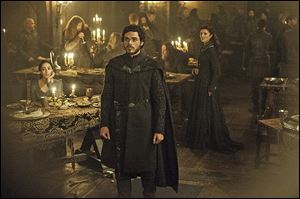
The killing goes on in ‘Thrones’
4/4/2014
From left, Oona Chaplin, Richard Madden, and Michelle Fairley in a scene from the ‘Game of Thrones’season 4.
The title of the fourth season of Game of Thrones says it all. Yes, "All Men Must Die" and at this point, the only way HBO’s great and addictive epic could shock us would be to air a season without the death of at least one major character.
As The Lion King might put it, it's the "Circle of Life" in the Seven Kingdoms of the mythical continent of Westeros, the setting for the series based on the series of fantasy novels by George R.R. Martin. As the new season kicks off at 9 p.m. Sunday, fans are still trying to sort out the implications of the infamous Red Wedding episode (actually titled "The Rains of Castamere") from season three. It was only the ninth of the season's ten episodes, but remains the most memorable, not only because of the slaughter of major characters Robb, Catelyn, and Talisa Stark (Richard Madden, Michelle Fairley, and Oona Chaplin), but because the massacre left the perception of a significant power vacuum in the overall story.
The fourth season opens with questions about whether the Starks can still wield influence in the Seven Kingdoms. Can Ned's bastard son Jon Snow (Kit Harington ) lead the family? Ned's daughter Sansa (Sophie Turner) has married Tyrion Lannister (Peter Dinklage), but it is a political marriage arranged by Tywin Lannister (Charles Dance) after he discovered the plot to unite the Stark and Tyrell factions by marrying Sansa off to Loras Tyrell (Finn Jones). Can she use the marriage to "the Imp" to the advantage of what's left of her family?
There's yet another wedding in the offing in season four, and given what happened last season, it's eagerly anticipated: The sadistic boy king Joffrey Baratheon (Jack Gleeson) will tie the knot (probably several of them, but let's not get to the honeymoon just yet) with Lady Margaery Tyrell (Natalie Dormer). No one would ever nominate Joffrey as husband of the year, but Margaery and her grandmother, Olenna, (Diana Rigg), know the value of a great political alliance when they see one. So what if your husband-to-be is a sadist? Nobody's perfect.
Adding to our anticipation of the wedding is the arrival of wedding guest Prince Oberyn Martell (Pedro Pascal), a sexual omnivore known as the Red Viper who has little fondness for the Lannisters. Naturally, the Lannisters are a little worried about what he may have brought as a wedding gift.
Of course, there are even more plot strings than there are kingdoms in Westeros, and yes, the season lives up to its title in the first few episodes.
But putting aside the deaths, marriages, betrayals, and other quotidian events in the Seven Kingdoms, the fourth season quickly announces itself as a significant transitional phase in the unfolding of the epic: With so many major characters now gone, we can feel Game of Thrones moving forward, not only with new players such as the Red Viper, but with the younger generation assuming larger and perhaps in the future, pivotal roles.
Even without getting into specifics of what happens in season four, we've already seen Sansa move to center stage, not just because of her marriage to Tyrion, but also because she exhibits the kind of strategic intelligence we would expect from a major player. If her father's execution didn't toughen her up, surely the deaths of her brother and mother have. Perhaps reluctantly, she has become a survivor.
But even more fascinating is her younger sister Arya (Maisie Williams), who has already shown herself wise and self-reliant beyond her years.
Even without having seen a single second of the new season, fans already know she is destined to play a significant role in the story.
We also see other characters evolving. The peaceable learn to play rough, previously self-assured confront self-doubt, and Theon Greyjoy (Alfie Allen) and Jaime Lannister (Nikolaj Coster-Waldau) have to go on without key body parts.
For many series, killing off some major characters and having others change only happens because writers want to come up with something to renew viewer interest. In contrast, Game of Thrones isn't afraid of change: It's the lifeblood of the series, and just one of the reasons we keep watching.